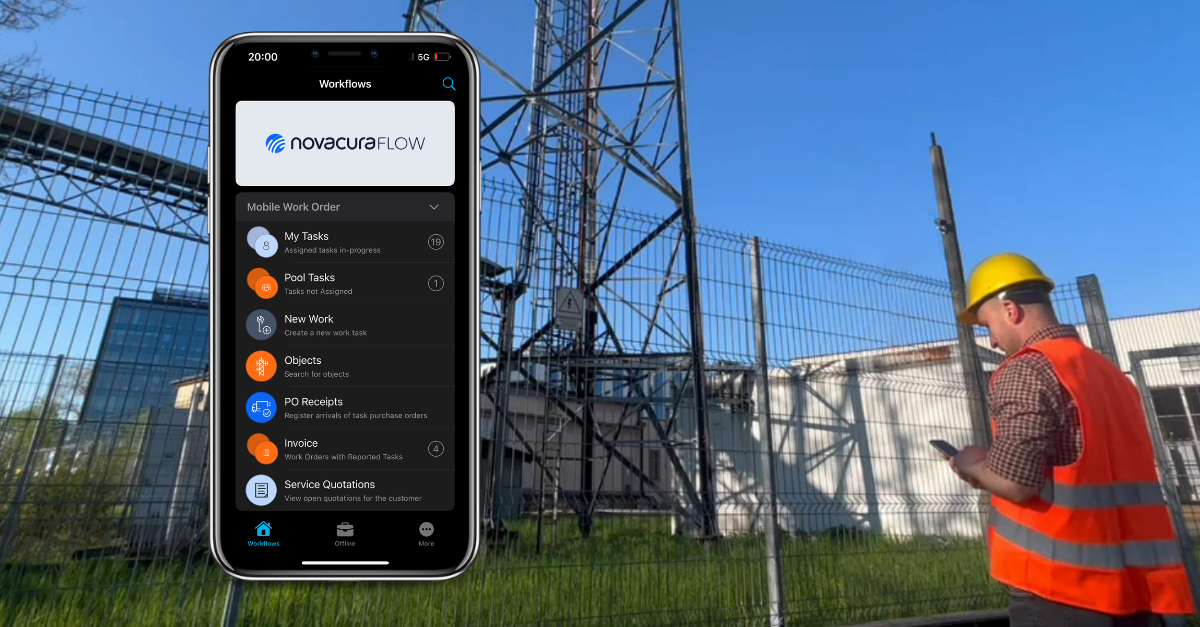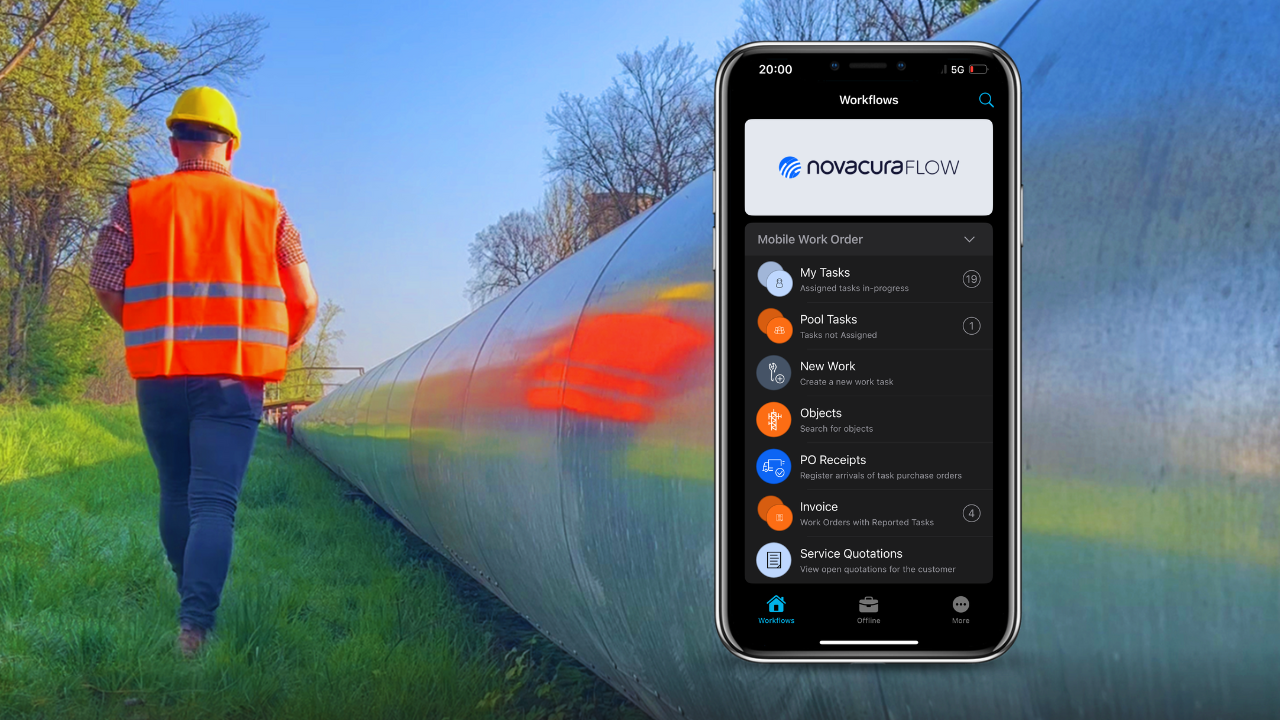Field Service Management Software connected to ERP
Today, companies that operate in field services and provide maintenance are often closely dependent on ERP systems. However, ERP capabilities often go far beyond the scope of FSM processes, which can only be supported by highly customized software tailored to the specific needs of service industry businesses. The system transactions in ERP allow the organization to run basic operations but does not include the detailed data needed to perform all operations dedicated to FSM effectively. For this reason, field personnel still perform FSM-related tasks with typical paperwork in their hands and then record manually in the ERP system. Manual data entry causes many discrepancies in the system and delays, which lead to much more serious problems and can have significant financial consequences. In addition, inefficiencies in FSM lead to problems with data flow, which is very important for industries that provide services such as public transport, logistics, energy supply, railway installations maintenance, machinery maintenance in manufacturing, and many others. Only a company with mobile solutions for industrial maintenance in the hands of its personnel will be effective enough to deal with the day-to-day business problems associated with field services and maintenance in a highly dynamic environment. What is field service management software? Enterprise Field Service Management software is a system that provides personnel with the capabilities to perform field services and maintenance. Organizations that depend on industrial installations in different locations around big cities and the entire country must often provide services to these installations to ensure their continued functionality. Therefore, the FSM software capabilities should deliver these functions: Mobile access: the FSM should provide mobile applications that can be used by field personnel on mobile devices where they can perform checklists, record damages, system functionality faults, and all operations that are needed for their industry-specific equipment and installation requirements. Offline mode: organizations that are location-dependent with limited network access should be able to record data on mobile devices that can be updated in the ERP system when the network is available again. The Novacura apps have an offline mode. Field workers can retrieve information about the equipment needed for the inspection or reparations and then update the data in the central system. System customization: each industry requires a different approach to field service and maintenance, and business requirements can change; therefore, FSM should be easy to adapt when needs increase or system transaction models change. Real-time data sharing: the FSM is dependent on remote field staff, but the decision-making process should be centralized; therefore, it is important that the FSM continuously provides real-time data to the central management unit to allocate existing resources better. Work order management: the FSM should provide functions accessible from mobile devices that allow easy material pre-order, tool/equipment allocation, process step updates, and even direct access to work instructions with remote assistance. Personnel management and scheduling: the FSM should have built-in functionality for allocating various resources and scheduling personnel, which is critical for any field service to provide services in a timely manner and schedule sufficient working hours, as well […]
learn more
What are the benefits of FSM software from Novacura Flow?
The maintenance role in various industries focuses on a management approach that predominantly relies on time-driven scheduling or repetitive tasks such as inspection of equipment, monitoring of plant conditions, or in some cases, lubrication of mechanical components. The oil and gas, refining and distribution, transportation, construction, and building development industries require continuous field service and maintenance to prevent catastrophic failure modes. The maintenance should provide periodic adjustments to maintain the required levels of reliability and availability. The complexity of today’s field service management cannot be handled simply and cost-effectively without the support of FSM software, which brings definitive advances to the business when it comes to personnel management, failure detection and preventive action, data analysis, forecasting, and even inventory management. The implementation of FSM software guarantees efficient operations through sustainable methodologies and field service management techniques. The only software that can provide maximum flexibility with configurable features will be the most suitable to cover an organization’s functional requirements for field services. Why use field service management software? Companies should consider implementing FSM software for several reasons. Here are the main factors that drive the need to implement FSM software: Intensifying energy efficiency – maintenance can prevent uncontrolled energy consumption, as well as eliminate increased energy consumption by inefficient electrical equipment or installations that may need to be replaced with modern technology. In this way, companies can use less energy but also take advantage of various asset management models that are important for site management and generally towards building efficiency, which among others, can help reduce water consumption, etc. Standardise procedures, time, and costs – companies use maintenance to reduce or prevent the expense of major equipment failures, which tend to be more costly. Companies can also minimize spare parts inventories, reduce the need for backup equipment and increase equipment uptime, which automatically creates maximum production revenue. Systematic strategy – with FSM software, companies can implement various maintenance models, such as preventive, corrective, and predictive maintenance, to help develop a strategy and action plan for planned services and relocation of resources during operational failures caused by plant failure. Companies can also benefit significantly from workforce management by reducing overtime, providing a better workload balance, and managing tasks and contracts. Safety and supporting the energy transition – transport and plant management have an impact on climate change, the maintenance of which can reduce business requirements and plays an important role mainly related to reducing waste, pollution, and carbon emissions. In this case, companies use FSM software to improve safety and pollution control. Continuous optimization – FSM software can help stimulate initial action rather than reaction, indicates support to the user from a continuous improvement perspective, as well as improving equipment reliability over time that ensures consistent quality. FSM software provides both short- and long-term value to corrective actions, which will have a positive impact on ROI. What are the 5 types of service industry? Industrial services for FSM include various installations and equipment at remote locations but also at various stations and plants. Here some of the […]
learn more
Field service management software that connects to IFS: key benefits
Service and maintenance projects necessitate focused attention on FSM-based control systems. The intricacies of service work highlight that FSM can optimize efficiency only when underpinned by customizable software that aligns with business requirements. When determining a cost-effective approach to procuring FSM software, companies should assess its integration capabilities with ERP systems. This approach enables businesses to maintain lower costs when expanding the ERP system with supplementary FSM functionalities. Utilizing the right FSM software facilitates the customization of functionalities without the need for external software development support. Consequently, this approach ensures ERP modifications remain cost-free, effectively establishing the FSM software as an independent layer integrated atop the ERP. Some ERP providers, such as IFS, offer specialized integration capabilities that connect the ERP system with FSM software. This integration empowers IFS users to manage field service and maintenance functions within a segregated system environment. This enables IFS users to align maintenance standards with business objectives, with a strong focus on cost efficiency. Linking FSM software to an IFS ERP system enhances a company’s technological capabilities, delivering numerous benefits, including free customizations and more (as detailed below). What is field service management software? Many industrial companies are required to adhere to particular standards related to health, reliability, customer satisfaction, safety, quality, and even security. Field service management software plays a crucial role in upholding and preserving these standards, facilitating the use of digital systems to collect data and carry out essential tasks. FSM software facilitates the integration of data from ongoing operations into all maintenance practices and methods. This empowers maintenance departments to oversee their work, enhance the efficiency of maintenance tasks, address customer concerns, and respond to emergency situations effectively. Internal: An in-house maintenance structure that relies on internal resources and operates independently, managing facilities and remote installations using only the company’s own personnel. External: Involves external organizations that provide the required assistance independently, often utilizing third-party services to maintain the operational efficiency of equipment and installations. What is a field service platform? FSM software comprises two primary components that collectively play a crucial role in overseeing operations at remote locations. Together, they constitute an integral field service platform. These essential components for effective field service and maintenance management include: Mobility: FSM software should offer mobile functionality for field workers who utilize customized mobile applications on their mobile devices. This empowers them to conduct equipment and installation inspections with enhanced speed and accuracy, ultimately improving the efficiency of maintenance operations. Portals: FSM software should facilitate comprehensive control over field operations through a centralized administrative hub. Here, managers and shift planners can meticulously plan maintenance schedules, make informed forecasts, and devise maintenance strategies based on pertinent operational needs, all within a single interactive portal. This consolidated view allows for a more streamlined approach to maintenance management. Indeed, only a select few systems in the market offer a complete maintenance platform that aligns with the comprehensive criteria needed for FSM software. Novacura presents the Novacura Flow software solution, which functions as a service platform, delivering users with the full spectrum of FSM capabilities along with a platform […]
learn more
How to choose mobile field service management software?
Field service and maintenance management software should provide on-site management and technical services for businesses in a variety of industries, including manufacturing facilities, commercial and government buildings, hospitals, railroad infrastructure, and even large sports complexes, which require extensive security compliance control to guarantee thousands of visitors complete safety during sporting events. Field services and maintenance should include a strategic planning function, which is very difficult to accomplish without proper instruments for extensive management of operations at various locations across the country. Companies such as SweMaint and Holmen, whose successful operations are closely dependent on well-managed field and maintenance services, are just one example. These companies operate in manufacturing, maintenance, and field service, providing flexible and consistent support for locations and equipment. Despite the different areas of field service and maintenance operations, these companies require cost-saving results when performing maintenance services, as well as more efficient labor management. Obviously, these companies wanted to make the right choice on FSM software to avoid poor planning and organization that lead to poor maintenance management and backlogs. Buying FSM software can be pretty difficult if the software does not offer specific capabilities and features, giving companies visible benefits in the long run. What are the features of field service software? FSM software provides control over critical elements in industrial operations. Therefore, in practical maintenance, it is important to provide its users with software that includes certain functions and allows users to develop a maintenance management framework with remote control of industrial equipment and installations. Here are several important features of FSM software: Work order management – FSM should perform as a job scheduling software where all job progress is visible in the system and can be easily tracked and controlled by planners providing the organization with real-time visibility software functions. Constant data collection – information acquisition and constant data exchange require FSM to process as analytical data software, where staff can get analytical information at any time to prepare better forecasts. Personnel Management – to perform all operations most efficiently, FSM should support working hour assignments and act simply as workforce management software, making scheduling easier even in unpredictable cases like personnel shortages. Business Process Management – high workloads in various industries require simplifying the most complex operations in an organization, so FSM should provide business automation software capabilities where processes can be simplified with a better user interface, etc. Deep ERP integration – FSM software can maintain higher performance when it has integration software capabilities, allowing it to connect existing systems in the organization and integrate with another ERP system and implement that way the ERP evergreen strategy. Who are the key players in field service management? The features above are absolute standards for the successful procurement of maintenance software. Companies that want to invest in process optimization should also consider performance metrics that allow them to collect relevant data from the entire operation, which can include maintenance performance metrics or financial data with an assessment of annual maintenance expenses and much more. Key players who provide FSM software […]
learn more
IFS Field Service Management with Novacura Flow
Maintenance and field services for equipment and all electromechanical systems are becoming a strategic tools in most industries, regardless of equipment and network extension complexity. Monitoring the entire business system and networks provides operational dynamics analysis and supporting technologies to prevent unexpected events that can cause massive operational problems and unplanned downtime. Field services are needed to ensure the equipment’s ability to accurately determine the operating condition and isolate the root cause of possible aberrations. Field services and maintenance are mainly applicable to industries that depend on equipment located in remote locations and local installations in their premises. These operations involve property management, which is very common in high-tech industries. Among these, we can point to telecommunications, the energy industry, construction, building maintenance, the railroad industry, various field services, and manufacturing. For all these industries, it is required to provide services that guarantee the standard functionality of equipment in different locations with mobile access to general services and maintenance systems, which includes warranty repairs, parts management, specific price assessment, personnel scheduling with the definition of working hours along with all the logistics processes involved (GPS scheduling, tracking, and tracing operations). Companies that want to be most efficient in their cost evaluation and process optimization programs within complex service management should take appropriate precautions on preventive and corrective maintenance, as well as maintenance improvement within the autonomous work order. What is IFS field service management? Process optimization programs include equipment control systems that give a company the correct parameters to evaluate its service and maintenance requirements. One of the Field Service Management systems has been introduced by IFS as a process monitoring and optimization program for organizations operating in the field service, high-tech, medical equipment, and telecommunications industries. The IFS Field Service Management software system provides its users with the following capabilities: Optimized planning and scheduling: resource modelling and planning with travel time, route optimization, and working hours. Field service management: work order management and performance management. Customer engagement: CRM capabilities within ERP portlets. Reverse logistics and warehouse repair: parts management that ensures parts flow back to the warehouse and OEM repair providers when required. Intelligent asset monitoring: monitoring technologies with service levels for tracking reparations of individual pieces of equipment. IFS has been the leader of Gartner’s Magic Quadrant for Field Service Management 7 times, and for the last time in 2022. What is an FSM solution from Novacura? The IFS FSM solution has its base on IFS ERP. IFS FSM, despite its extended capabilities, is strictly characterized as an off-the-shelf solution. From this perspective, IFS FSM has limited mobile capabilities in terms of the available customizations that are required in various industries. Novacura offers its fully customized mobile solution for field service management, combined with IFS ERP as a system layer on top of ERP. With this solution, companies using IFS ERP can enhance their capabilities with customized software that allows easy modifications directly by users. Novacura’s FSM solution was developed as part of Novacura Flow software based on a low-code platform. https://www.novacura.com/wp-content/uploads/2022/08/nc-www-app-creation-in-flow.mp4 The example presented […]
learn more
How to improve the operations of the construction site with mobility
Practices in the construction industry can be classified according to operational activities in different fields. Civil engineering and construction projects differ from their functionality and can be related to metropolitan commercial buildings, energy facilities projects, high-way bridges and even as much particulate as house residential district in the nearest neighbourhood of our hometown. These types of projects require a lot of time and high expenses. They must be managed well to complete the entire project with its time and cost limitations. A crucial assessment of construction projects focuses on the critical path method (CPM). The approach to this assessment allows developers to establish a complete plan for each stage of a construction project. Common construction hurdles in project management Construction project management accelerates the various areas of investment that are important for creating a comprehensive CPM plan. Although each project is very unique, we can note some basic practices that are important for CPM planning. Determining project planning – identifying dependencies for project with fundamental CPM engineering assessment. Resource management – planning material manufacturing, manpower, machines and equipment with suppliers, including carriers within good supply chain solution for construction requirements. Time control –aligning manufacturing deadlines with project phases, machines availability and scheduling complete workload for investment closed in the timeframe. Financial control and project costs system – creating cash-flow system and evaluating cost requirements and financing stages for the project. The various tasks performed in a construction project reveal several areas that need to be targeted and managed properly. A lack of a proper management approach can affect operational areas as follows: Coordination Labour Failures – insufficient staff scheduling affects safety, quality, time scheduling and manual work performance. Lack of good staff coordination can cause very costly delays in the contracts on which construction depends. Lack of materials – materials from manufacturers should be delivered on schedule. Lack of materials on site can cause construction downtime, as some construction stages cannot be completed and skipped. Machines and equipment failures –lack of maintenance and service keep the project from moving forward. Unplanned downtime and machine breakdowns can also mean costly repairs and/or replacement. Wrong cost estimations – unexpected costs can be caused by failures that are related to insufficient labour or machine management. All operating costs calculated inaccurately at individual stages, incorrect forecasts and completions can bring the entire project to stop in a matter of day. Mobile solution for construction project management Many construction projects have adopted the just-in-time method. According to this approach, engineers need solutions to help them coordinate each stage of the project under the critical path method (CPM). Project coordinators will focus on effective labour management (time and tasks), supply chain management (scheduled deliveries), documentation management, good maintenance of machinery and the financial system. To maintain control over all these processes, a well-integrated system that can give mobile control over all micro-operations inside a construction project can be a good solution. Novacura provides mobile solutions for managing construction projects with its low-code platform, Novacura Flow. Resource management is made easier, and workforce activities can be controlled […]
learn more
 December 2, 2024
December 2, 2024  10 min to read
10 min to read 











